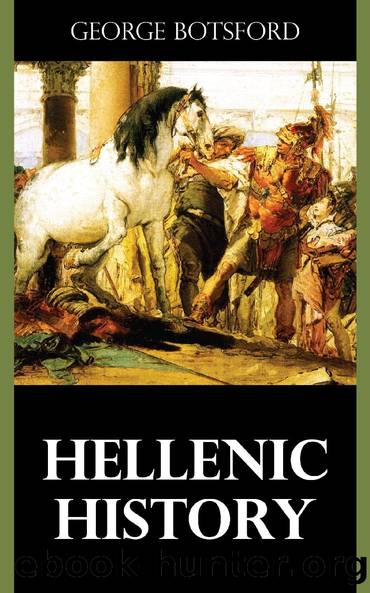Hellenic History by George Botsford

Author:George Botsford
Language: eng
Format: epub
Publisher: URS Corporation
CHAPTER XVI.THE AGE OF PERICLES
SOCIETY AND PUBLIC WORKS
SOCIETY AND ECONOMY
Conservative eupatrids In this democratic world many of the old nobility found themselves totally out of place. Their bitter complaints were given voice in pamphlets issued by one of their number shortly after the death of Pericles—the earliest extant political treatise in any language. Unknown by name, the author has aptly been styled Old Oligarch. Characteristically he laments the decline of those arts in which his class took chief pride: “Citizens giving their time to gymnastics and music are not to be found at Athens; the commons have abolished them, not from disbelief in the beauty and honor of such training, but recognizing the cultivation of these arts to be beyond their powers.” Formerly rich men alone enjoyed such luxuries, but now “the people have built at public cost a number of palestras, dressing rooms, and bathing establishments for their own use; and the mob, rather than the few choice and well-to-do people, get the chief benefit of them.” It is equally a shame that in dramatic festivals “the rich man trains the chorus, and the people reap the enjoyment.”
He laments even more the growth of the naval power with its sailor crowd at the expense of the heavy infantry, composed of respectable middle-class citizens, the tyrannical treatment of the allies, the oppression of the wealthy throughout the empire by the levy of taxes and by favoritism toward the poor—evils he has greatly exaggerated. “The fact that everywhere more consideration is shown to the base, the poor, and the common folk than to persons of good quality, far from being a matter of surprise, is evidently the keystone of the democracy.” All this is natural, he argues, when you consider the character of the ruling class in the imperial city. “Within the ranks of the people will be found the utmost ignorance, disorderliness and rascality, traceable chiefly to poverty.” He reaches the very heart of the class conflict when he says: “The people do not want the City to be well governed and themselves in slavery; they desire to be free and to be masters.” It is these poor people, this common folk, this riff-raff, whose prosperity and increasing numbers enhance democracy, whereas the shifting of fortune to the wealthy and the better class would bring into control a strong party opposed to popular rule.” If you want good legislation, you will see the most intelligent members of the community making laws for the rest; and then the better class will curb and chastise the lower orders. The better class will sit in council in behalf of the state, and not suffer crack-brained fellows to belong to the council or to speak in the assembly. But under the weight of such blessings the people will shortly fall into slavery.” These hard words reveal the existence of a class of men, strong in wealth, social standing and intelligence who were watching their opportunity to usurp the government and enslave the populace, who would hesitate at no violence or treason to gain their ends.
Download
This site does not store any files on its server. We only index and link to content provided by other sites. Please contact the content providers to delete copyright contents if any and email us, we'll remove relevant links or contents immediately.
| Africa | Americas |
| Arctic & Antarctica | Asia |
| Australia & Oceania | Europe |
| Middle East | Russia |
| United States | World |
| Ancient Civilizations | Military |
| Historical Study & Educational Resources |
Mythos (2019 Re-Issue) by Stephen Fry(1568)
Alexander the Great by Robin Lane Fox(1358)
On Sparta (Penguin Classics) by Plutarch(1192)
Antigone Rising: The Subversive Power of the Ancient Myths by Helen Morales(1140)
Persian Fire by Tom Holland(1084)
The Last Days of Socrates by Plato & Christopher Rowe & Plato(1016)
The Classical World: An Epic History From Homer to Hadrian by Robin Lane Fox(1008)
Cicero by Anthony Everitt(992)
The Athenian Constitution (Classics) by Aristotle(945)
Antigone Rising by Helen Morales(843)
The Greek World(821)
The Riddle of the Labyrinth(820)
The Story of the Greeks (Yesterday's Classics) by Guerber H. A(797)
The Homeric Hymns (Penguin Classics) by Homer(755)
The End of the Bronze Age by Robert Drews;(744)
The Eudemian Ethics (Oxford World's Classics) by Kenny Anthony(741)
Guide to Greece by Pausanias(727)
Lords of the Sea: The Epic Story of the Athenian Navy and the Birth of Democracy by John R. Hale(707)
A History of My Times (Classics) by Xenophon(706)
